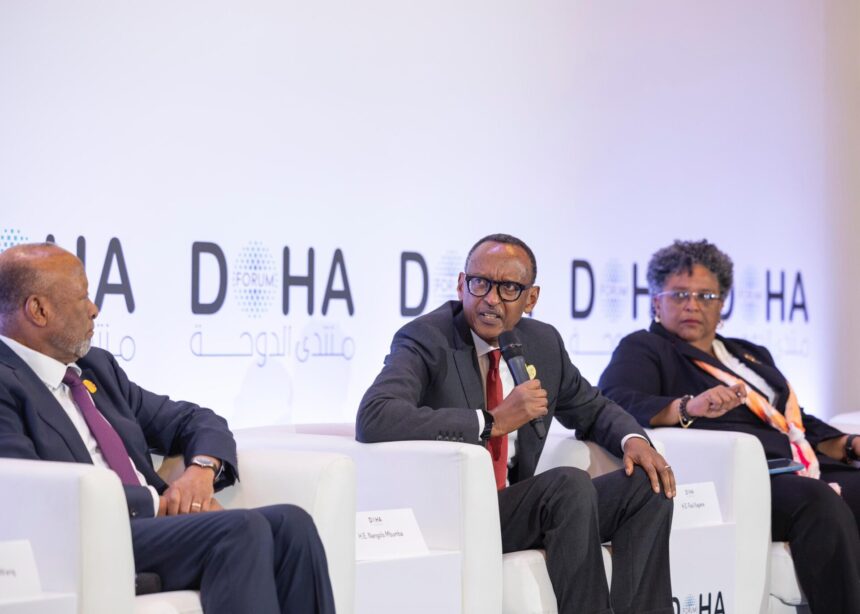President Nangolo Mbumba and his Rwandan counterpart Paul Kagame said they have been working with China in a partnership which seeks to optimise benefits for their people.
Mbumba noted that China has increasingly played an important and influential role in the global economy and development of African countries.
Mbumba said the impact that Chinese investments have had, in terms of infrastructural development, most particularly on the African continent but also elsewhere, has been transformational for many developing economies.
“The relationship that China has with the Global South is unique because China was never a coloniser in Africa or the Caribbean, and has always looked at establishing win-win cooperations with no historical hangover,” he stated at the Doha Forum in Qatar last weekend.
Under the banner “Diplomacy, Dialogue, Diversity”, the Doha Forum aimed to promote the interchange of ideas and discourse towards policymaking and action-oriented recommendations.
Additionally, the Doha Forum is a global platform for dialogue, bringing together leaders in policy to discuss critical challenges facing the world, and build innovative and action-driven networks.
Mbumba added that China’s growing role in the Global South and its effect on economic growth, peace and security are clear to all.
“The emergence of China as an economic, cultural and military power is, therefore, highly significant and important,” he said.
Mbumba stated that in Africa, China supported several countries during the days of the struggle for independence, maintaining faith and persevering through difficulty in the pursuit of freedom.
Afterwards, China continued to support African countries in the maintenance of their national sovereignty.
Latest figures show that trade between China and Namibia was by August this year hovering over N$19.3 billion, marking a significant increase in trade activities between the two nations.
In recent years, trade of Namibian products to China has been boosted by uranium exports from the Husab and Rössing mines.
During a panel discussion, Rwanda’s president Kagame concurred with Mbumba, saying that Chinese influence in Africa has benefitted many, with fewer strings attached.
Kagame addressed the growth of China in Africa’s economic development, discussing the benefits of the relations as well as the ongoing debates over the so-called “debt trap” allegations that have been levelled against China’s financial engagements in the region.
The Rwandan leader then touched on the global geopolitical competition, in which China plays a significantly inevitable role, further arguing that China’s approach to international competition has been more balanced and fairer than that of the Global North.
“The purpose of a global order is to have global stability, which we do not have. We need to realise that there is a lot we can do that benefits us in the Global South, but we need to come together,” stated Kagame.
The panel comprised Mbumba, Kagame, the Prime Minister of Barbados Mia Amor Mottley, and Henry Huiyao Wang, the founder and President of the Centre for China and Globalisation.
Rwanda’s exports to China grew from US$39 million in 2018 to US$131.2 million in 2023. Over the past five years, China has been Rwanda’s largest source of foreign direct investment (FDI), further strengthening bilateral trade relations.
The two nations also saw a bilateral trade volume of US$550 million in 2023, with China’s imports from Rwanda increasing by 86.2% from last year.
China’s investments in Rwanda, which have exceeded US$1.2 billion since 2019, span critical sectors like manufacturing, construction, real estate and mining.
Kagame said: “We do not see anything in history that suggests China has misused its strength. Rather, we have been benefitting from the cooperation and the attitude of bringing everybody to the table where everyone feels they are winning in the process.
We just need to work together, and make sure that we are contributing our fair share to this global stability that the world wants.”
Wang said China has been playing several roles in the Global South, especially at economic level and other spheres.
“China has launched the Belt and Road initiative, which encompasses 150 countries, most of them developing countries (Global South).
China has launched the Asian Infrastructure Investment Bank (AIB) to do infrastructure development and help the ACP (African, Caribbean and Pacific) region – the largest trade agreement in the world among others.
Even when China has in many ways lowered its tariffs, fulfilled its obligations, China still trades itself as a developing country because of its political identity,” highlighted Wang.


